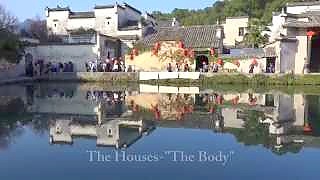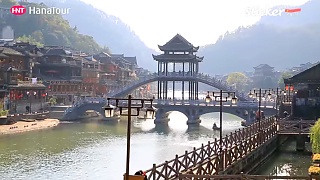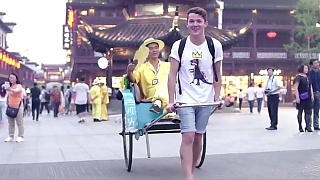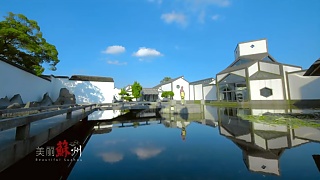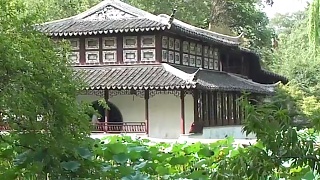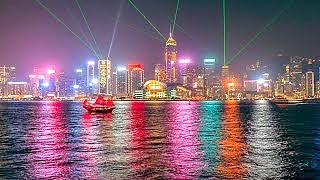With Pandaland Villager ...
[640],shadow=true,start=,stop=Visitor Guide to ShanTang River and ShanTang Street, SuZhou
Overview
ShanTang River and ShanTang Street, located in SuZhou, JiangSu Province, are renowned for their picturesque beauty and historical significance. Often referred to as the "Venice of the East," ShanTang Street is a perfect blend of traditional Chinese architecture, serene waterways, and vibrant local culture, making it a must-visit destination.
Historical Background of ShanTang River
ShanTang River, also known as the "Seven-Li Shantang," was originally constructed in 825 AD during the Tang Dynasty. The construction was overseen by Bai Juyi, a renowned poet and the then governor of SuZhou. The canal was built to connect SuZhou city with HuQiu (Tiger Hill), facilitating trade and transportation while providing a scenic route for travelers.
The project was an ambitious undertaking aimed at promoting economic development and improving water management in the region. The construction of the canal also helped to control flooding and provided a reliable source of water for irrigation, which was crucial for local agriculture.
Over the centuries, ShanTang River became a vital artery for the transportation of goods and people. It also served as a cultural hub, with the development of markets, temples, and residential areas along its banks. The river and the adjacent ShanTang Street became synonymous with prosperity and cultural richness, attracting scholars, merchants, and artists who contributed to the flourishing of SuZhou.
Getting There
By Air: The nearest airport is SuZhou Sunan Shuofang International Airport (WUX), located about 40 kilometers from the city center. From the airport, you can take a taxi or a shuttle bus to reach ShanTang Street.
By Train: SuZhou Railway Station is well-connected with major cities like Shanghai, HangZhou, and Nanjing. From the station, you can take a local bus or taxi to reach ShanTang Street.
By Bus: SuZhou is well-served by long-distance buses from nearby cities. The main bus station in SuZhou is SuZhou North Bus Station, from where you can take a local bus or taxi to ShanTang Street.
Getting Around
- Walking: The best way to explore ShanTang Street is on foot, allowing you to fully appreciate the historical buildings, quaint shops, and beautiful scenery.
- Boating: Taking a boat ride along the ShanTang River offers a unique perspective of the ancient town and its waterways.
- Local Transport: Taxis and local buses are available for traveling to and from different parts of SuZhou.
Main Attractions
ShanTang Street
This ancient street, with a history of over 1,100 years, stretches for about 3.5 kilometers along the ShanTang River. It is lined with well-preserved traditional buildings, charming shops, tea houses, and restaurants, offering a delightful walking experience.
ShanTang River
The ShanTang River is a scenic waterway that flows through the heart of the town. Boat rides along the river provide a tranquil and picturesque journey, showcasing the town's beautiful bridges, ancient buildings, and lush gardens.
Pingjiang Road
Located nearby, Pingjiang Road is another historic street that complements your visit to ShanTang Street. Known for its classical SuZhou gardens, traditional houses, and cultural sites, it offers a deeper understanding of SuZhou's rich heritage.
Baosheng Temple
Baosheng Temple, located along ShanTang Street, is a historic Buddhist temple with beautiful architecture and serene gardens. It provides a peaceful retreat and a glimpse into the town's religious heritage.
Tiger Hill
Just a short distance from ShanTang Street, Tiger Hill is a popular tourist attraction known for its natural beauty, historical sites, and the iconic Yunyan Pagoda, often referred to as the "Leaning Tower of China."
Local Cuisine
SuZhou's cuisine is known for its delicate flavors and emphasis on fresh, seasonal ingredients. Here are some must-try dishes:
- Sweet and Sour Mandarin Fish: A signature dish of SuZhou, featuring fresh fish cooked in a sweet and tangy sauce.
- Squirrel-Shaped Mandarin Fish: A beautifully presented dish with a crispy exterior and tender meat, often served with a sweet and sour sauce.
- SuZhou Noodles: Hand-pulled noodles served in a rich broth with various toppings, including pork, shrimp, and vegetables.
- Local Pastries: Try the traditional SuZhou-style mooncakes and other pastries filled with sweet or savory ingredients.
Shopping
- Local Handicrafts: ShanTang Street is famous for its traditional handicrafts, including silk products, embroidery, and paper-cutting. These items make for unique souvenirs.
- Antique Shops: Explore local antique shops for historical artifacts, vintage items, and collectibles.
- Tea Houses: Purchase high-quality Chinese tea from the local tea houses along ShanTang Street.
Accommodation
- Traditional Inns: For an authentic experience, consider staying in a traditional inn or guesthouse, which often feature historical architecture and local decor.
- Mid-Range Hotels: Options such as the SuZhou Garden Hotel and local boutique hotels provide comfortable accommodations at reasonable prices.
- Luxury Hotels: For a high-end stay, consider hotels like the SuZhou Marriott Hotel or the SuZhou Jinji Lake Grand Hotel, both offering excellent amenities and service.
Tips for Visitors
- Best Time to Visit: The best times to visit ShanTang Street are spring (April to June) and autumn (September to November) when the weather is mild and pleasant.
- Clothing: Wear comfortable walking shoes and dress in layers to accommodate changing temperatures. An umbrella or raincoat is useful during the rainy season.
- Respect Local Customs: Be respectful of local customs and traditions. Dress modestly and be mindful of local etiquette, especially when visiting historical and cultural sites.
- Language: While Mandarin is widely spoken, learning a few basic phrases or using a translation app can be very helpful.
- Plan Your Visit: ShanTang Street is best explored at a leisurely pace. Take your time to wander through the streets, visit local shops, and enjoy the tranquil atmosphere.
Conclusion
ShanTang River and ShanTang Street, with their rich history, traditional architecture, and picturesque scenery, offer a unique and memorable travel experience. Whether you're exploring ancient streets, savoring local cuisine, or taking a serene boat ride along the river, ShanTang provides an unforgettable glimpse into SuZhou's past. Plan your visit carefully to make the most of your trip to this charming destination in JiangSu Province.

 The ancient ShanTang River and ShanTang Street, SuZhou, JiangSu province
The ancient ShanTang River and ShanTang Street, SuZhou, JiangSu province
